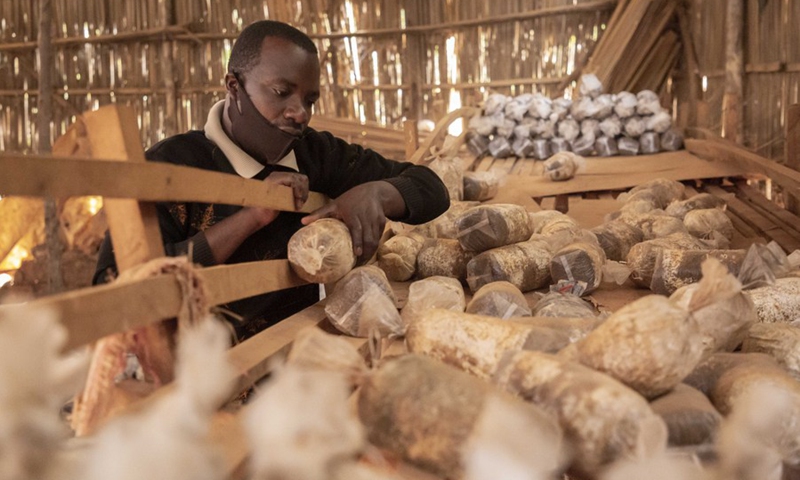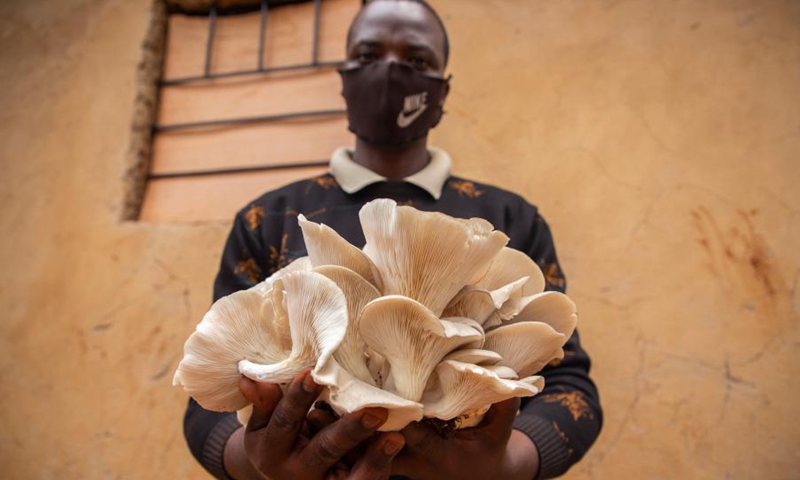
Emmanuel Ahimana, owner of a Rwandan company that applies Chinese-invented Juncao technology to grow mushrooms, checks mushroom tubes at his workshop in Kigali, the capital of Rwanda, Sept. 9, 2020. (Photo: Xinhua)

Emmanuel Ahimana, owner of a Rwandan company that applies Chinese-invented Juncao technology to grow mushrooms, poses for a photo with mushrooms at his workshop in Kigali, the capital of Rwanda, Sept. 9, 2020.(Photo: Xinhua)
Within a small production room in Gasabo, which is on the outskirts of Rwandan capital Kigali, a 35-year-old man emerges with mushroom tubes planted in polythene bags.
Emmanuel Ahimana, the owner of Biovita Production company, is applying Juncao technology to grow mushrooms.
Juncao, famed as "magic grass" and discovered by Chinese scientists, is an economical and environmentally friendly substitute for timber, which can be used as a substrate for growing mushrooms.
"We mix various materials such as Juncao powder, cotton husks imported from Uganda, Burundi or Tanzania, lime powder and water to produce mushroom tubes, " Ahimana told Xinhua in a recent interview.
The mixture is then boiled in vessels for about eight hours to kill bacteria.
Ahimana has a team of about five people who work passionately to improve their wellbeing through mushroom production.
Their mushroom tubes production capacity had progressed from about 1,500 to 2,000 tubes per month to 10,000 per month before COVID-19 pandemic broke out.
The mushrooms ready for consumption are priced at 2,000 Rwandan francs (about 2 U.S. dollars) per kilogram, while a kilogram of mushroom tubes goes for 450 Rwandan francs.
"It has been a source of livelihood for my family and my employees over the past years and I could get substantial profits from it," he said.
"In 'a good year,' we could earn a profit of between 7 million to 8 million Rwandan francs," Ahimana said.
Unfortunately, like many businesses, COVID-19 pandemic brought his business to a halt for more than one year due to a lack of raw materials, forcing him to survive on savings.
But the pandemic has not dulled his spirits. In August, the company started getting the required materials. He is hopeful to see the business restart after recently preparing some 4,500 mushroom tubes. He has also purchased one metric ton of cotton husks.
In fact, he is aiming to expand the business by constructing another mushroom production room and build a fence around them in order to keep thieves away.
Ahimana learned Juncao technology from Chinese experts. In 2014, with an urge for entrepreneurship, he decided to start his own mushroom growing business with a working capital of about six million Rwandan francs.
"Since then, my life has changed. At first, I was renting a plot of land where I operated. But using money from mushrooms, I bought my own plot which has enabled me to expand my business. I also bought a machine to cut grass using money from mushrooms," he said.
He said mushroom growing is a good business that has a ready market.
According to Rwanda Agriculture and Animal Resources Development Board (RAB), Juncao technology is high on the list of priority innovation in the country.
"Juncao technology has contributed to job creation, food security and income generation for rural communities in Rwanda and has played an important role in tackling malnutrition in the country," Patrick Karangwa, RAB Director General told Xinhua in a recent interview.
"Mushrooms grown in Rwanda are exported across the region, contributing to improved health and livelihoods of tens of thousands of farmers and customers," he said.
To date, roughly 15,000 stakeholders, most of them youth and women, are involved in mushroom production in the country, according to RAB.
Since 2006, experts from universities have maintained cooperation with the Rwandan government on Juncao technology, teaching and promoting Juncao and other agricultural technologies in the central African nation.
